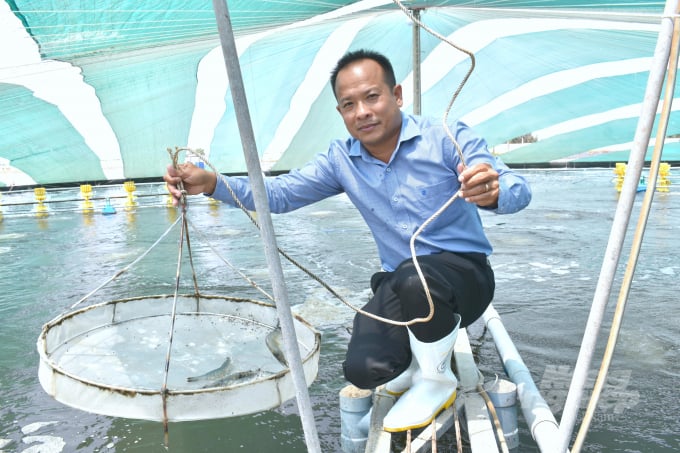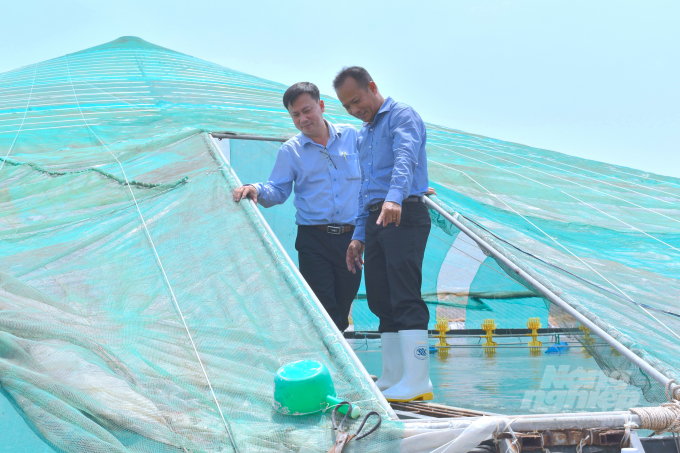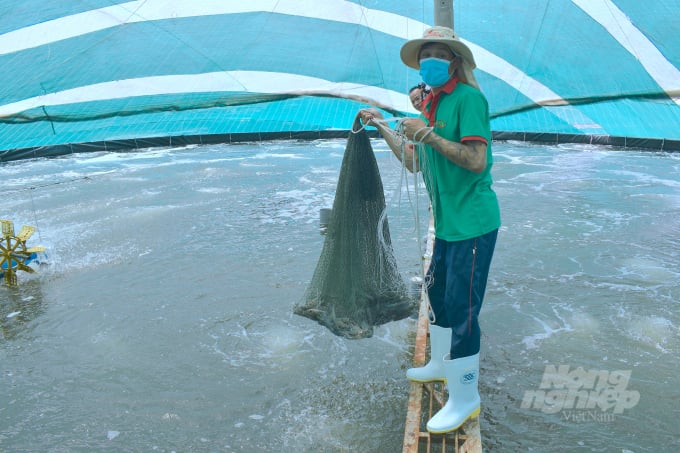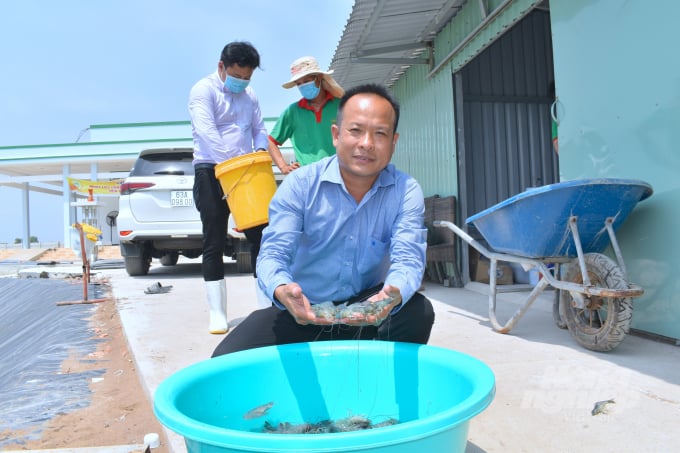June 21, 2025 | 00:58 GMT +7
June 21, 2025 | 00:58 GMT +7
Hotline: 0913.378.918
June 21, 2025 | 00:58 GMT +7
Hotline: 0913.378.918
With the opportunity to study about agricultural production as well as the lives of farmers in the drought-stricken area of Tan Phu Dong (Tien Giang), we learned about Mr. Ngo Minh Tuan (44 years old) in Bai Bun hamlet, Phu Thanh commune. Local people praised Mr. Tuan for being good at business as well as shrimp raising. Currently, he owns 5 of the most successful 30-hectare whiteleg shrimp farms in this country.

Mr. Ngo Minh Tuan currently owns the largest 30-hectare high-tech shrimp farm on Tan Phu Dong island, Tien Giang province. Photo: Minh Dam.
Meeting and talking with Mr. Tuan these days, we learned that he started his business as a shop selling aqua feed for local shrimp farmers. Originally, he was a farmer filled with a passion for agriculture, so in 2015, he learned and tested with whiteleg shrimp following a high-tech process.
He is an engineer with expertise in the field of fisheries combined with experience and learned techniques, so when applying the high-tech shrimp farming process, he was quite successful. After years of accumulating more capital, he procured more land to expand the model. To date, Mr. Ngo Minh Tuan owns 5 high-tech shrimp farms with over 30 hectares of land in Phu Thanh, Phu Tan (2 zones) and Phu Dong (1 zone).
After a long conversation, he took us on a tour on one of the farms that are ready to be harvested. We acknowledge that the large-scale investment is methodical and appropriate. With a high-tech shrimp farming model, he spends about 20% of the area to build shrimp ponds, the surrounding walls are made of concrete, the bottom is covered with tarpaulin, the surface of the pond is covered with nets. The remaining land area is reserved for ponds to treat the input and output water in accordance with regulations. On average, he invests about 1.5 billion VND per hectare of shrimp farming land.

Mr. Ngo Minh Tuan introducing to visitors about the high-tech shrimp farming process at the farm. Photo: Minh Dam.
After more than 6 years of implementing the model, Mr. Tuan has been successful, the shrimp yield is 45-50 tons/ha, 2 times higher than that of previously implemented traditional shrimp farming models, the profit is over 40%. Specifically, in 2020, he harvested 440 tons of shrimp. Last year, due to the Covid-19 pandemic, the crop was cut so production decreased to 360 tons.
With a keen economic mindset, he said that he always finds and signs outputs before starting production. In order to meet the needs of customers all year round as well as to avoid overstocking, he rotates shrimp crops among farms, thereby reducing the risk of fluctuating market prices. The most successful aspect of this high-tech white-leg shrimp farming model is the fact that shrimp's survival rate up to harvest can reach over 90%, so it is guaranteed to be profitable.
Sharing the secret of successful model implementation, Mr. Ngo Minh Tuan said: The rearing process, the seed must be excellent, the water must be clean and the rearing must be qualified for oxygen, check the environment daily and most importantly farmers must have good farming techniques. This high-tech farming model reduces risks, has no disease, is very safe and brings higher yields.

Farmed shrimp ready to be harvested. Photo: Minh Dam.
As we see, the high-tech shrimp farms elonging to Mr. Ngo Minh Tuan are one of the largest and most well-invested models in the Mekong Delta. To implement the model with high efficiency, he has recruited and trained 40 workers skilled with shrimp ponds, including 14 highly qualified fisheries engineers.
In addition to high-tech shrimp farming, Mr. Ngo Minh Tuan's family also develops the business of food, aquatic veterinary medicine and supplying shrimp seed to local people. Currently, Tuan Hien Aquaculture Co., Ltd, owned by him, has many distributors in Phu Thanh and Phu Tan communes to serve the shrimp farming needs of farmers. From which, nearly 200 farmers in Tan Phu Dong and Go Cong Dong districts have come to learn, replicate the model and receive his advice, help, supply of inputs in livestock production.
Thanks to his attachment to high-tech white-leg shrimp, Mr. Ngo Minh Tuan's family has become well off and has been dubbed the "island billionaire". According to Mr. Tuan, only high-tech shrimp can help island farmers change their lives, but successful farming is a process, requiring farmers to have capital and breeding techniques. In the future, he plans to continue to replicate this model and help many farmers develop their own models replacing the traditional farming ones with many risks to get rich together in his homeland.

Mr. Ngo Minh Tuan checking the size of shrimps ready to be harvested. Photo: Minh Dam.
Currently, Mr. Tuan is also the Chairman of Tan Phu Dong District Business Association, he is very active in charity and social activities in the locality. Mr. Nguyen Van Doan - Secretary of the Party Committee of Phu Thanh Commune, Tan Phu Dong District, Tien Giang Province commented: Mr. Ngo Minh Tuan's model is very effective. If replicated and sustainable, shrimps in Tan Phu Dong district will develop strongly. Mr. Tuan is both an owner of a fishery economic development business and a social worker who is very good at supporting the poor, households with difficulties in housing construction; supporting difficult campaigns during the Covid-19 pandemic.
Translated by Nguyen Hai Long
/2025/06/17/3942-2-143243_548.jpg)
(VAN) Recently, in Sweden, the Secretary of the Binh Dinh Provincial Party Committee presented the Investment Registration Certificate for the 'Polyester Fabric Recycling Complex' project to SYRE Impact-AB Company.
/2025/06/12/3721-2-202745_83.jpg)
(VAN) TH made an impression at Seoul Food 2025 with its line of natural beverages, paving the way for Vietnamese food products to enter the South Korean market.

(VAN) Soc Trang's success in rice exports stems from a strategy of developing fragrant and specialty rice cultivation areas and standardizing production toward low-emission practices.
/2025/06/11/1311-5-120811_839.jpg)
(VAN) The pig farming industry is facing the challenge of comprehensive restructuring to meet requirements for quality, safety, traceability, and market expansion both domestically and for export.

(VAN) Vietnam considers participating in ALGROALBA in order to expand agricultural production, coordinate the assessment and effective exploitation potential land.
/2025/06/05/5314-1-184727_407.jpg)
(VAN) From seemingly worthless fish scales and skin, enzymes and lactic ferments can transform by-products into peptides, opening a sustainable, effective business direction and elevating Vietnamese seafood.

(VAN) TTC AgriS and IFC signed a strategic partnership to develop a sustainable agricultural value chain, aiming to achieve the Net Zero target by 2035.